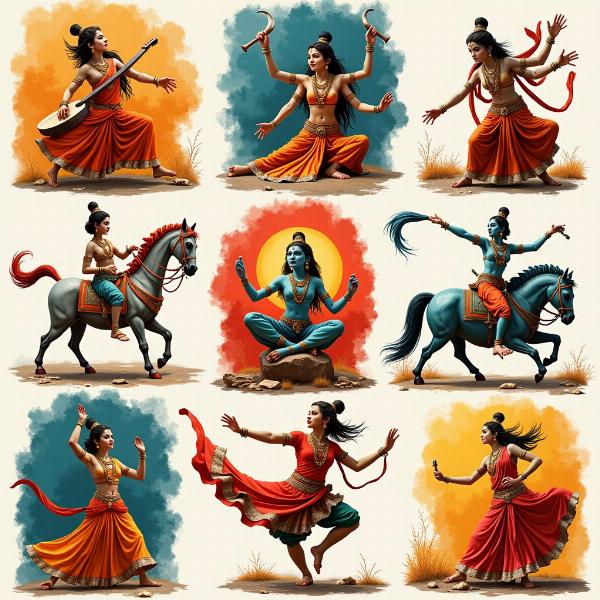Understanding the meaning of “kala” in Hindi can be tricky, as it carries a rich tapestry of meanings depending on the context. This guide explores the various interpretations of “kala,” from its association with art and skill to its deeper philosophical connotations related to time and death. We’ll delve into examples, cultural connections, and related terms to provide a comprehensive understanding of this multifaceted word.
Exploring the Multifaceted Meanings of Kala
“Kala” is a word that resonates deeply within Indian culture, appearing in literature, music, and everyday conversation. Its primary meanings revolve around art, skill, craft, and performance. Imagine the intricate “kala” of a skilled artisan crafting a delicate miniature painting or the mesmerizing “kala” of a classical dancer expressing complex emotions through graceful movements. This is the essence of “kala” as a creative expression.
However, “kala” also holds a deeper, more philosophical meaning. It can refer to time, specifically in its destructive or negative aspect. Think of the inevitable march of time that eventually leads to decay and death. This association with mortality gives “kala” a certain gravity and reminds us of the ephemeral nature of existence. It’s this duality – the beauty of creation and the inevitability of destruction – that makes “kala” such a compelling and thought-provoking word.
 Indian Art and the Concept of Kala
Indian Art and the Concept of Kala
Kala in Everyday Usage and Idioms
The word “kala” finds its way into everyday Hindi conversations through various idioms and expressions. For example, “kala ka baaz” refers to someone who is highly skilled or adept at something, a master of their craft. This idiom emphasizes the expertise and precision associated with “kala.” Conversely, “kala dhan” refers to black money, illicitly acquired wealth. Here, “kala” takes on a negative connotation, highlighting the darkness and illegitimacy of such gains.
Kala and its Connection to Indian Philosophy
In Indian philosophy, “kala” is often associated with the concept of time as a destructive force. It is seen as the devourer, the ultimate agent of change and transformation. This philosophical understanding adds another layer of complexity to the word, linking it to the cyclical nature of creation and destruction that forms the basis of many Indian spiritual traditions.
What does “kalaakar” mean?
“Kalaakar” refers to an artist, a practitioner of “kala.” This term directly connects to the artistic meaning of “kala,” highlighting the individual who embodies skill, creativity, and artistic expression.
Is “kala” always associated with negativity?
While “kala” can refer to time’s destructive aspect, it’s not inherently negative. Its association with art and skill carries a positive connotation, celebrating human creativity and mastery. The negative aspect emerges when “kala” is linked to mortality and decay.
Kala in Different Contexts: Art, Time, and Beyond
The meaning of “kala” can shift depending on the context. For example, in a discussion about art, “kala” would refer to the artistic skill or the artwork itself. However, in a philosophical discourse, “kala” might signify time’s destructive power. Understanding this contextual variation is crucial for grasping the true meaning of “kala” in any given situation.
Conclusion: Unveiling the Essence of Kala
From its vibrant association with art and skill to its profound connection with time and mortality, “kala” is a word that encapsulates the complexities of human existence. By exploring its various meanings, cultural connections, and philosophical implications, we can gain a deeper appreciation for this multifaceted word and its significance within Indian culture. Understanding “kala” is key to unlocking a deeper understanding of Indian art, philosophy, and language.
FAQ:
- What is the most common meaning of “kala”? The most common meaning of “kala” is art, skill, or craft.
- Does “kala” have any negative meanings? Yes, “kala” can also refer to time in its destructive aspect, associating it with mortality and decay. It can also refer to illicit wealth (kala dhan).
- What is the difference between “kala” and “kalaakar”? “Kala” refers to the art or skill, while “kalaakar” refers to the artist or practitioner of that skill.
- How is “kala” used in Indian philosophy? “Kala” is often associated with the concept of time as a destructive force in Indian philosophy.
- Can “kala” mean different things in different contexts? Yes, the meaning of “kala” can vary depending on the context, ranging from art and skill to time and mortality.
- What is “kala dhan”? Kala dhan refers to black money or illegally acquired wealth.
- What is a “kala ka baaz”? Kala ka baaz refers to a person who is highly skilled or adept at something.
kalam in hindi meaning
kalatmak meaning in hindi
kala shah kala meaning in hindi
kalantar meaning in hindi
Meaning-Hindi.in is your one-stop solution for all your Hindi translation needs. We offer a wide range of professional translation services, including business and commercial document translation, certified and legal document translation, technical and user manual translation, website and localization translation, educational and academic document translation, express translation, and specialized translation services. Contact us today for accurate and culturally sensitive translations that bridge the language gap. Email: [email protected], Phone: +91 11-4502-7584. Meaning-Hindi.in is committed to providing high-quality, reliable translation services.